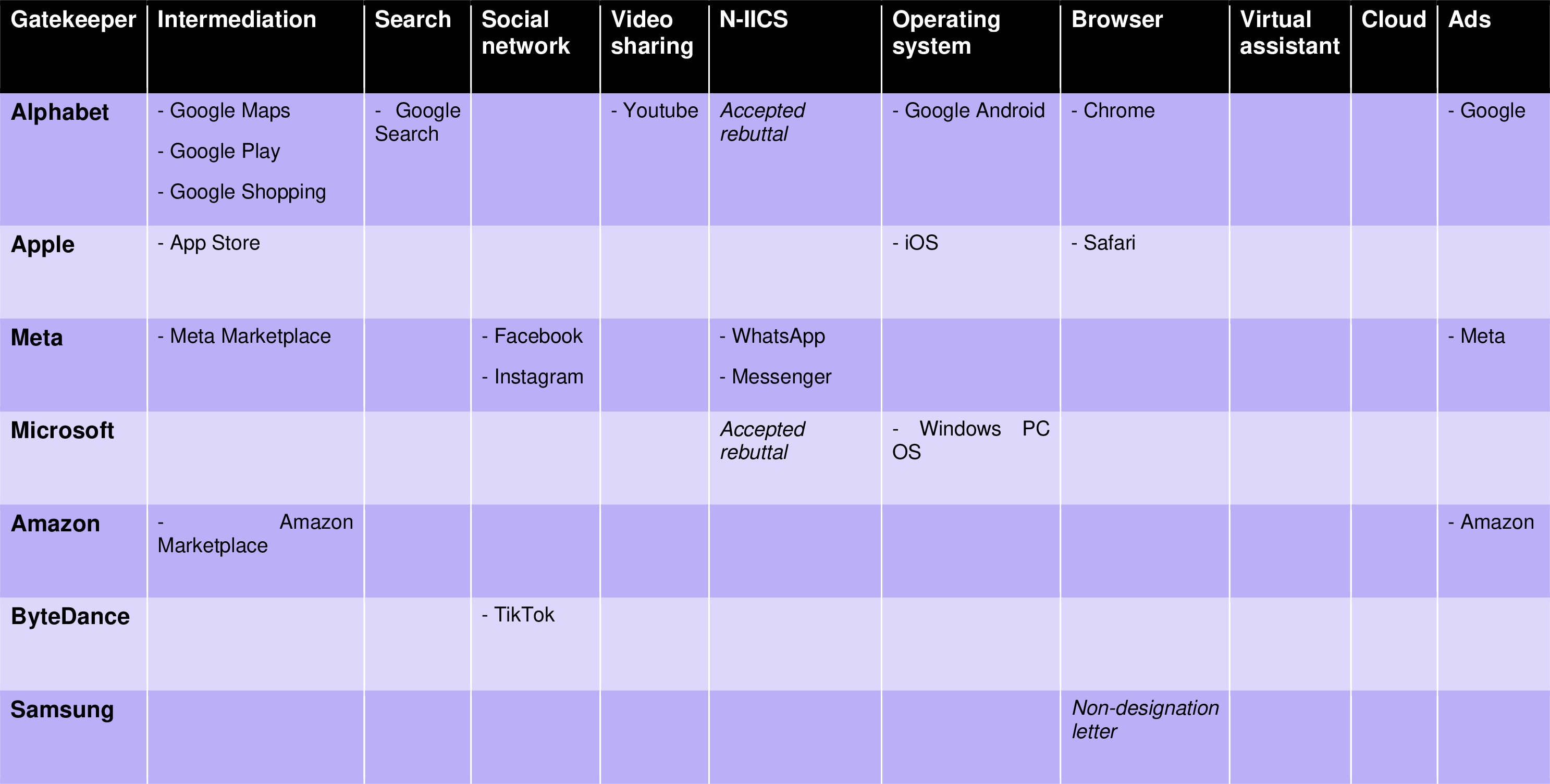EU designates first six gatekeepers under the DMA
The Digital Markets Act (DMA) of the EU is a milestone for EU regulation of digital markets. The Act aims to ensure fair competition and protect the openness of digital services by regulating so-called gatekeepers. Gatekeepers are companies providing core platform services defined in the DMA. These services can be considered a gateway between a large number of business users and consumers.
Who are the first gatekeepers?
The Commission designated Alphabet, Amazon, Apple, ByteDance, Meta, and Microsoft as the first six gatekeepers this September. These companies now have six months to ensure their 22 designated core platform services to fully comply with the DMA.
(Klick here or on the image for enlarged version)

Further review of some services
Additionally, although Gmail, Outlook.com and Samsung Internet Browser meet the statutory quantitative user thresholds of the DMA to qualify Alphabet, Microsoft and Samsung as gatekeepers, the Commission accepted the companies‘ argument that these services are not „important gateways“ (see above). They were not designated as core platform services, meaning that Samsung has not been designated as a gatekeeper with respect to any core platform service.
The Commission has additionally opened market investigations to further assess whether Microsoft’s services Bing, Edge and Microsoft Advertising and Apple’s iMessage do not qualify as gateways despite meeting the thresholds and another investigation to determine whether Apple’s iPad OS qualifies as a gateway despite not meeting the thresholds.
A gatekeeper’s obligations
Gatekeepers are bound to specific obligations and forbidden from certain practices designed to prevent preferential treatment of their own digital products and services, ensure fair competition and to protect the digital market. The six designated companies now have six months to submit a compliance report, which will be monitored by the Commission.
Already, gatekeepers must report all intended mergers where the merging entities or the target provide core platform services or any other services in the digital sector or enable the collection of data.
Non-compliance can be sanctioned with significant fines of up to 10 % of the company’s total worldwide annual turnover – up to 20 % in case of repeat infringements – or periodic penalty payments of up to 5 % of the average daily turnover. Additional remedies may be imposed in the event of systematic infringements, with structural remedies and the divestiture of (parts of) a business as ultima ratio.
What’s next?
Pre-compliance discussions between the Commission and the designated gatekeepers have started, with gatekeepers having to meet DMA obligations by March 2024. The recent Gatekeeper designations may still be appealed until mid-November 2023.
The above-mentioned market investigations are ongoing, with decisions in the rebuttal investigations expected in February 2024. The five investigations may result in further designations, although no new companies are currently under review as potential gatekeepers. Further gatekeepers may be designated in the future if and when more companies meet the designation thresholds.
Additionally, with the latest amendment to the German Act against Restraints of Competition that has been passed by Bundestag in July and Bundesrat on 29 September 2023, Germany extends statutory provisions that grant damages claims in case of antitrust violations to DMA violations. By this core elements of the German transposition of the Damages Directive and the standard used for private enforcement of Art. 101 and 102 TFEU are applied to the DMA and Commission decisions based thereon.
The implementation of the DMA will continue to raise important and complex questions for companies across the digital sector as it is developed in the years to come. While we see the European Commission’s first steps in public enforcement of the DMA, private enforcement looms on the horizon as well.
The recently published book the “New Digital Markets Act – A Practitioner’s Guide” is our take on the background, implementation and compliance with the DMA. For further advice and individual solutions concerning the DMA and related competition matters, do not hesitate to contact us.
Well
informed
Subscribe to our newsletter now to stay up to date on the latest developments.
Subscribe now










